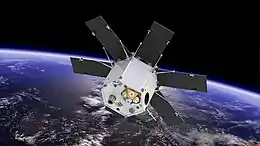 | |
| Mission type | Technology demonstration Earth observation |
|---|---|
| Operator | Sputnix |
| COSPAR ID | 2014-033H |
| SATCAT no. | 40017 |
| Website | At sputnix.ru (Russian) |
| Mission duration | Elapsed: 9 years, 6 months, 25 days |
| Spacecraft properties | |
| Launch mass | 26.2 kg (58 lb) |
| Start of mission | |
| Launch date | 19 June 2014, 19:11 UTC |
| Rocket | Dnepr |
| Launch site | Dombarovsky |
| Orbital parameters | |
| Reference system | Geocentric |
| Eccentricity | 0 |
| Perigee altitude | 620 km (390 mi) |
| Apogee altitude | 620 km (390 mi) |
| Inclination | 97.9° |
TabletSat-Aurora is a Russian micro-satellite launched in 2014. The satellite is built in shape of hexagonal prism, with 6 foldable solar panels.[1] It is claimed to be the first privately developed satellite in Russian Federation.
Launch
TabletSat-Aurora was launched from Dombarovsky site 13, Russia, on 19 June 2014 by a Dnepr rocket.[2] Two-way communication with Earth was successfully established soon after launch.[3]
Mission
It intended to verify technologies for the future satellite constellation Earth observation technologies[1] Main payload is the panchromatic photo camera capable of 15m resolution at nadir.[4]
See also
References
- 1 2 "TabletSat-Aurora". spaceflight101.com. Retrieved March 18, 2023.
- ↑ "First Russian Private Earth Remote Sensing Satellite". GIM International. Retrieved March 18, 2023.
- ↑ "Russian private satellite transmitted the first signal to Earth (translated from Russian)". June 19, 2014. Retrieved March 18, 2023.
- ↑ Krebs, Gunter D. "TabletSat-Aurora". Gunter's Space Page. Retrieved March 18, 2023.
External links
This article is issued from Wikipedia. The text is licensed under Creative Commons - Attribution - Sharealike. Additional terms may apply for the media files.